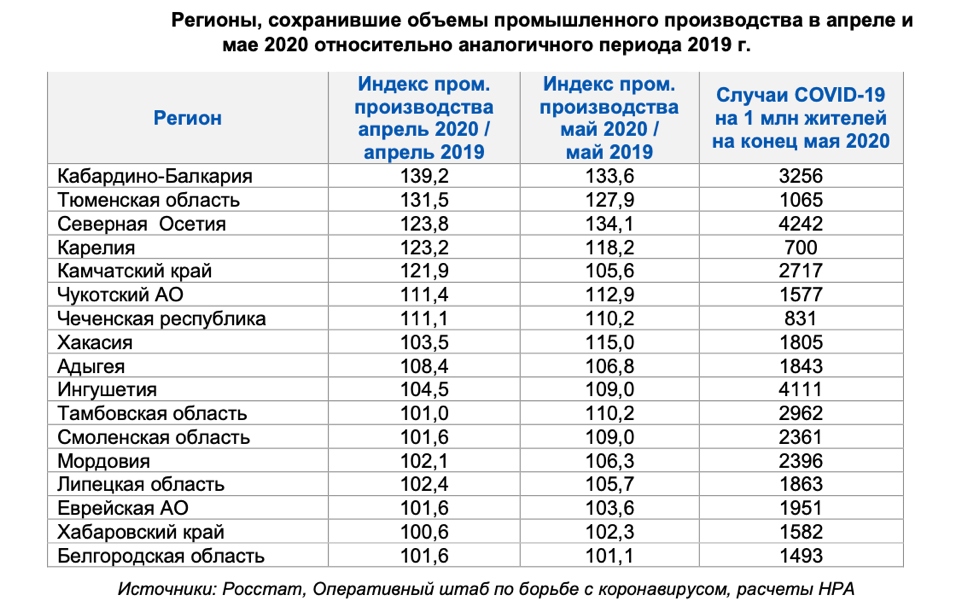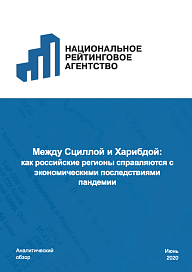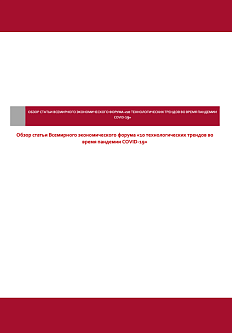Experts from the National Rating Agency present a study of the impact of the coronavirus pandemic and the restrictions against it on the economy of Russian regions. The study provides indicators of industrial production, examines the situation on the labor market, regional budget revenues and other aspects of the pandemic impact on regional economies.
Roscongress Foundation analysts highlighted the main theses of this research, accompanying each of them with suitable fragments of video broadcasts of panel discussions held as part of business programs of the key events hosted by the Foundation.
In 10 regions of Russia, industrial production in April 2020 decreased by more than 20% compared to the corresponding period of the previous year, in half of these regions a similar decline was recorded in May. The fall was avoided by regions with a large share of mining, food processing and continuous production. However, the absence of recession at the moment can be partly explained by inertial factors, and these regions are also expected to decline.
For most regions the introduction of «non-working days» and the actual suspension of activities of many companies is expected to have resulted in a significant decline in economic activity indicators. In Russia as a whole, the volume of industrial production in April 2020 was 6.6% lower than the result of April 2019, in May 2020 by 9.6% lower than the result of May 2020.
17 regions of Russia managed to prevent a decrease in production both in April and in May 2020. The top three leaders in industrial production growth in period of non-working days include such regions as Kabardino-Balkaria (+ 39.2% in April and +33 , 6% in May), Tyumen Region (+ 31.5% in April and + 27.9% in May) and North Ossetia (+ 23.8% in April and + 34.1% in May). The stability of these regions to the crisis can be explained by the industrial structure of these regions and the role of enterprises whose activities have not been suspended (food industry, extraction and processing of natural resources). In addition, the absence of a drop in industrial production is explained by the low base effect (for example, in Khakassia).

An increase in the unemployment rate in the first four months of 2020 was recorded in most regions of the country. Despite the fact that the overall increase in the number of unemployed is not yet significant (+0.4 p.p. for the country as a whole), the unemployment situation is highly likely to worsen during the year against the background of the continuing economic recession and the closure of a number of enterprises.
One of the expected consequences of the «coronavirus» economic crisis is a growth of unemployment. Regional statistics for January-April 2020 show
that the number of unemployed in most regions is increasing indeed: the average unemployment rate in the first four months of 2020 (including the pre-crisis January and March) increased in 72 of the 85 regions. This can be explained both by the presence of a large share of industries less affected by the «coronacrisis» (listed above), and by inertia in the preparation of reports and registration of unemployed.
The fight against pandemic consequences can significantly increase the burden on regional budgets, which is fraught with an increase in the deficit, subjects public debt and the demand for transfers from the federal budget, which will become the main way to cover deficits.
The budget deficit of the regions of Russia in 2020 will amount to about RUB 200-300 billion, or 2.5-3.5% of their total revenues. At the same time, the growth and volume of the deficit will differ greatly from region to region. Thus, in Yekaterinburg, the budget deficit in 2020 may almost double up to RUB 3.4 billion, or 15.4% of the volume of city revenues. The budget deficit of St. Petersburg during this period may increase by 6.6%, up to RUB 111 billion.
The main ways to cover the deficits will be transfers from the federal budget (in the Plan to overcome the economic consequences of the new coronavirus infection, published by the Government of the Russian Federation in early June, financial assistance to the regions is estimated at RUB 200 billion) and debt financing (budget and commercial loans).
Video: https://roscongress.org/sessions/regionalnyy-byudzhet-potratit-nelzya-sekonomit/search/#00:09:27.551
See other materials posted in special sections of the Roscongress Information and Analytical System, COVID-19, StayHomeEconomy, Regional Policy and Budget Planning , dedicated to the response to the coronavirus outbreak, possible ways to stabilize the economy in the pandemic, as well as finding opportunities for economic growth and improving living standards.






